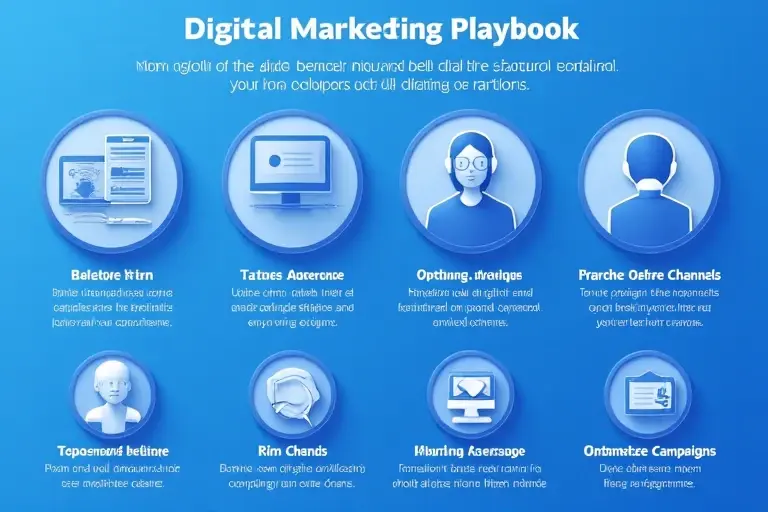
A well-crafted digital marketing playbook is a critical tool for businesses aiming to streamline their marketing efforts, improve collaboration, and ensure consistent brand messaging across all channels. A digital marketing playbook acts as a comprehensive guide that outlines your strategy, processes, and best practices, making it easier for your marketing team to execute campaigns effectively. In this article, we will explore how to create a digital marketing playbook that aligns with your business objectives and empowers your team to succeed.
A digital marketing playbook provides a centralized framework that guides your marketing team in executing campaigns and ensuring consistency across all channels. Without a playbook, your team might struggle with misalignment, inconsistent messaging, or lack of direction. Here are some key reasons why creating a digital marketing strategy playbook is crucial:
A well-executed Digital Marketing Strategy helps in aligning all your marketing activities to drive measurable results and create a unified approach to your campaigns.
Creating a digital marketing playbook requires careful planning and collaboration. Follow these steps to craft a comprehensive and effective playbook for your marketing team:
Before creating the playbook, establish clear and measurable marketing goals aligned with your business objectives. Are you aiming to increase sales, raise brand awareness, or improve customer engagement? Ensure that these goals are specific, measurable, achievable, relevant, and time-bound (SMART).
For instance, if your objective is to increase ROI in digital marketing, your playbook should include actionable tactics that contribute to improving conversion rates, click-through rates, and customer acquisition costs.
Your digital marketing strategy will only be effective if it targets the right audience. Therefore, it's essential to define your target audience in your playbook. This includes:
By understanding your audience, you can tailor your campaigns to resonate with them and increase engagement. The Social Media Marketing section of the playbook, for instance, can outline best practices for targeting specific demographics on different platforms.
Identify which digital marketing channels are most effective for your business and how they will be integrated into your overall strategy. These channels could include:
Each channel should have a dedicated section in the playbook outlining goals, strategies, key tools, and resources.
To ensure that all team members are on the same page, outline the standard operating procedures (SOPs) and best practices for each aspect of your digital marketing efforts. This will create a consistent approach to your campaigns. Some key areas to focus on:
Including a digital marketing funnel in your playbook will also help your team understand where they should focus their efforts within the customer journey, whether they are creating awareness, driving interest, or converting leads.
A content calendar is essential for organizing your marketing efforts and ensuring consistent content output. Include a timeline for your marketing campaigns, noting key dates, content launches, and deadlines for tasks.
Use this calendar to:
You can also set up recurring tasks for campaigns like social media marketing and email newsletters to streamline execution.
Lastly, your playbook should include guidelines for regularly monitoring campaign performance and optimizing based on data insights. For example:
The digital marketing landscape is always changing, so it's essential to review and update your playbook regularly to reflect new trends, tools, and best practices. This ensures that your team stays ahead of the curve and that your strategy remains relevant.
A digital marketing playbook is an essential tool for any business looking to organize its marketing efforts and drive consistent results. By defining clear goals, identifying your target audience, and outlining specific strategies for each channel, your playbook provides the structure and guidance needed to execute successful marketing campaigns. With the right processes in place, your team will have the resources they need to succeed, optimize performance, and contribute to the overall growth of the business.
What is a digital marketing playbook?
A digital marketing playbook is a comprehensive guide that outlines your marketing strategy, processes, and best practices for executing campaigns.
Why do I need a digital marketing playbook?
It helps ensure consistency, streamline processes, improve efficiency, and scale your marketing efforts as your team grows.
What should be included in a digital marketing playbook?
The playbook should include your goals, target audience, marketing channels, processes, best practices, content calendar, and performance tracking.
How often should I update my digital marketing playbook?
You should review and update your playbook regularly to reflect changes in the digital marketing landscape, trends, and new tools.
What are some key digital marketing channels to include in a playbook?
Include SEO, social media marketing, email marketing, PPC campaigns, and mobile marketing as core channels.
How can A/B testing be incorporated into the playbook?
A/B testing should be part of your optimization process, where you test various elements in campaigns to identify what works best.
What is the importance of using data analytics in the playbook?
Data analytics helps you track campaign performance, measure KPIs, and make data-driven decisions to optimize future campaigns.
How do I create a content calendar for my team?
Use the content calendar to plan, schedule, and track content creation, promotions, and campaigns. Make sure all team members have access to it.
What are the benefits of a digital marketing funnel?
The digital marketing funnel helps guide potential customers through stages of awareness, consideration, and decision-making, increasing conversions.
Can a playbook help onboard new team members?
Yes, a well-organized playbook can quickly familiarize new team members with your marketing strategy, processes, and goals.